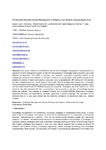Collaborative Semantic Content Management: an Ongoing Case Study for Imaging Applications

Use this link to cite
http://hdl.handle.net/2183/41945Collections
- Investigación (FIC) [1728]
Metadata
Show full item recordTitle
Collaborative Semantic Content Management: an Ongoing Case Study for Imaging ApplicationsAuthor(s)
Date
2010Citation
Ciuciu, I., Meersman, R., Schmid, J., Magnenat-Thalmann, N., Iglesias Guitián, J. A., & Gobbetti, E. (2010). Collaborative semantic content management: an ongoing case study for imaging applications. In Proceedings of the 11th European Conference on Knowledge Management. Universidade Lusíada de Vila Nova de Famalicão Portugal, pp 257-267
Abstract
[Abstract]: This paper presents a collaborative solution for knowledge management, implemented as a
semantic content management system (CMS) with the purpose of knowledge sharing between users with
different backgrounds. The CMS is enriched with semantic annotations, enabling content to be
categorized, retrieved and published on the Web thanks to the Linked Open Data (LOD) principle which
enables the linking of data inside existing resources using a standardized URI mechanism. Annotations
are done collaboratively as a social process. Users with different backgrounds express their knowledge
using structured natural language. The user knowledge is captured thanks to an ontologic approach and it
can be further transformed into RDF(S) classes and properties. Ontologies are at the heart of our CMS
and they naturally co-evolve with their communities of use to provide a new way of knowledge sharing
inside the network. The ontology is modeled following the so-called DOGMA (Developing Ontology-
Grounded Methods and Applications) paradigm, grounded in natural language. The approach will be
demonstrated on a use case concerning the semantic annotation of anatomical data (e.g. medical
images).
Keywords
Knowledge management
Content management system
Collaborative ontology engineering
Social Web
Content management system
Collaborative ontology engineering
Social Web
Description
Presented at: 11th European Conference on Knowledge Management 2010 (ECKM 2010), Vila Nova de Famalicao, Portugal 2-3 September 2010.
Editor version
Rights
Copyright © The Authors, (2010). All Rights Reserved.
ISSN
2048-8971
ISBN
978-1-62276-527-0 978-190663871-9





